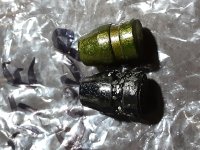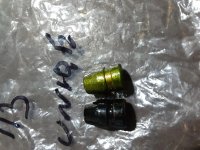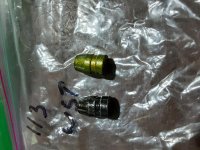I have a 1909 Triple Lock, 2nd Model 44, 3rd Model 44, Outdoorsman 38/44s, Model 1950 45 target and Model 1950 44 target. Can I use jacket bullets in all of them or should i use cast is some of them. I will be loading for accuracy not maximum velocity.
You are using an out of date browser. It may not display this or other websites correctly.
You should upgrade or use an alternative browser.
You should upgrade or use an alternative browser.
Cast vs. Jacketed
- Thread starter Doug627
- Start date
Register to hide this ad
Rpg
Member
You can safely use either at reasonable pressure and velocity, however most folks would prefer cast bullets.
If I use cast bullets, do I need gas checks and lube?
muddocktor
Member
I would go with polymer or powder coated and not worry about lube or gas checks myself.
Gas checks can improve some magnum loads but are a waste of money at under about 1,000 fps. The only revolver in your list that I might load over 1,000 fps is the N frame .38 Special so I doubt that you'll want them. Even at the highest velocities normally obtained from .357 & .44 Magnums I've always been able to find loads that are just as accurate and do not lead without using gas checks. However, your luck might not be as good if you can only choose between bullets that someone else casts.
Above about 700 fps bare lead bullets need some kind of lubrication. My preference is the old NRA 50/50 beeswax/alox lube or a similar home made substitute injected into the grooves in a lubricator sizer press but there are alternatives.
Above about 700 fps bare lead bullets need some kind of lubrication. My preference is the old NRA 50/50 beeswax/alox lube or a similar home made substitute injected into the grooves in a lubricator sizer press but there are alternatives.
Last edited:
gwpercle
Member
No and yes , gas checks are not required ...plain based cast lead bullets will do nicely but lubrication or a coating is needed .If I use cast bullets, do I need gas checks and lube?
These revolvers and calibers are perfectly suited to lead bullets .
Stick with standard velocities and don't try to magnumize your loads . The rifling will last longer with lead .
A gas check will help with loads approaching 1,000 fps but again don't hot load these older revolvers too much ... I suggest lead bullets at moderate velocities .
Gary
Last edited:
It's a matter of personal choice. I prefer to cast bullets for my handguns, but I still occasionally use jacketed bullets. So my preference would be cast bullets. I have only used gas checks on two bullets, both for heavy loads in my 44 Magnums and plain based bullets work quite well (38/357 caliber through 45 caliber) for all other applications. Yes lube is needed on cast bullets and PCing, if not purchased, can be pretty involved with equipment, supplies and time. If purchasing coated bullets you still should get bullets that fit your gun (bullet diameter vs, throat diameter).
Personally I would find a mild to mid load in my reloading manual(s) and use plain based cast bullets. No need to push those "classic" revolvers...
Personally I would find a mild to mid load in my reloading manual(s) and use plain based cast bullets. No need to push those "classic" revolvers...
LoboGunLeather
US Veteran
Good points made by several members. All I would add is that jacketed bullets require greater force to move through the forcing cone and bore due to the higher degree of resistance caused by the harder surface of the bullet jacket.
Good cast bullets of suitable diameter and profile are much easier on the gun than any jacketed bullet, requiring lower charges and pressures to achieve any given level of performance. For the quality vintage firearms you mention cast bullets would be my preference, allowing reasonable use with less stress on the firearm, thus retaining original condition for future value.
RE: gas checks; as mentioned above, not a requirement for modest loads. A good cast bullet that properly fits the gun can be driven to 1000FPS or more without leading. In .38 Spl, .44 Spl, .45 (ACP or Colt) there is nothing to be gained. In fact, I routinely load .357 magnum plain-based cast bullets to ~1200FPS with no problems in any of several vintage revolvers (Model 19, Model 28, pre-27, Colt SAA).
Any of the modern cast bullet lubes are more than sufficient for modest pressures and velocities. I have always used NRA-formula Alox, which some object to because of smoke and sooty residue, but I never experienced any difficulties.
Good cast bullets of suitable diameter and profile are much easier on the gun than any jacketed bullet, requiring lower charges and pressures to achieve any given level of performance. For the quality vintage firearms you mention cast bullets would be my preference, allowing reasonable use with less stress on the firearm, thus retaining original condition for future value.
RE: gas checks; as mentioned above, not a requirement for modest loads. A good cast bullet that properly fits the gun can be driven to 1000FPS or more without leading. In .38 Spl, .44 Spl, .45 (ACP or Colt) there is nothing to be gained. In fact, I routinely load .357 magnum plain-based cast bullets to ~1200FPS with no problems in any of several vintage revolvers (Model 19, Model 28, pre-27, Colt SAA).
Any of the modern cast bullet lubes are more than sufficient for modest pressures and velocities. I have always used NRA-formula Alox, which some object to because of smoke and sooty residue, but I never experienced any difficulties.
RonPagan
Member
As others have said there are many people making cast bullets if you don't want to start casting your own. Wax lubes smokes alot more than hi tek. I tried powder coating bullets but settled on hi tek. After throwing some bullets coated with each in a baggie of powder I found the powder coat doesn't stand up like hi tek. I'll go get a picture to demonstrate. The powder coat also adds a tiny amount of thickness to the portion of the bullet that the sizing die doesn't touch so depending on the profile of the bullet you may feel some resistance on chambering. My reference for this is a 45 acp revolver so you probably don't have to worry about that bit.
Here's a little look at what titegroup does to powder coat vs hi tek.
Been in a bag with a bit of gunpowder since 1/3/20 wst and unique for comparison.




Here's a little look at what titegroup does to powder coat vs hi tek.
Been in a bag with a bit of gunpowder since 1/3/20 wst and unique for comparison.




Last edited:
Autonomous
Member
- Joined
- Feb 25, 2017
- Messages
- 1,151
- Reaction score
- 1,787
Hi-Tek coated lead bullets are clean and accurate.
Get some.
Get some.
Given your fine taste in vintage S&W revolvers,  you might find that "period correct" cast bullets (aka: boolits) enhance your shooting experience.
you might find that "period correct" cast bullets (aka: boolits) enhance your shooting experience.
Lyman offered (offers) at least one bullet mold that was designed around the specifications for each of your revolvers. Most of those are still available, either as molds or as ready cast bullets from commercial casters. You can further extend your enjoyment by using the old NRA bullet lube formula consisting of 50/50 beeswax and Alox 2138f.
It is entirely possible to order unlubricated cast bullets sized to your guns, and your specified alloy hardness, which you could lube yourself. Or, you can size them easily enough on a standard loading press with a Lee bullet sizer kit. In fact, the Lee tumble lube included in those kits is pretty good.
Jacketed bullets do increase pressure and, to a degree, general wear and tear. Besides consideration for the bore, the increased pressure does accelerate wear evidenced by things such as increased barrel-cylinder gap, endshake, and (maybe) slow timing. Maybe not much, but there is a cumulative risk with extended use.
Consider as well that jacketed bullets do have a low side velocity threshold for which you must stay above to avoid risk of a getting one stuck in your barrel.
Enjoy those nice classics!
Jim
Lyman offered (offers) at least one bullet mold that was designed around the specifications for each of your revolvers. Most of those are still available, either as molds or as ready cast bullets from commercial casters. You can further extend your enjoyment by using the old NRA bullet lube formula consisting of 50/50 beeswax and Alox 2138f.
It is entirely possible to order unlubricated cast bullets sized to your guns, and your specified alloy hardness, which you could lube yourself. Or, you can size them easily enough on a standard loading press with a Lee bullet sizer kit. In fact, the Lee tumble lube included in those kits is pretty good.
Jacketed bullets do increase pressure and, to a degree, general wear and tear. Besides consideration for the bore, the increased pressure does accelerate wear evidenced by things such as increased barrel-cylinder gap, endshake, and (maybe) slow timing. Maybe not much, but there is a cumulative risk with extended use.
Consider as well that jacketed bullets do have a low side velocity threshold for which you must stay above to avoid risk of a getting one stuck in your barrel.
Enjoy those nice classics!
Jim
AManWearingAHat
Member
You can use either safely, just stay inside the manual guidelines
boatbum101
Member
If they were mine they'd never ever see a jacketed or plated bullet . All listed will shoot very well with lead . The 45 might take some work as it's not uncommon for them to have oversize cylinder throats . The 44 specials will show very good accuracy with lead & less than 1000fps . The 38/44 mine is quite accurate with the Keith designed 358429 or wadcutters . I've shot the Keith loads with 2400 in it for years . but now days use 4227 with the same bullet . Older barrel steel was not as hard as current production barrels . Use of jacketed bullets will accelerate wear & added powder needed will also contribute to wear . Older guns were made for cast bullets at sedate velocities .
I will slug the barrels and go with lubed cast bullets. Thank you for the responses.
38SPL HV
Member
Suggest you use cast lead bullets. I recall reading where Smith and Wesson recommended lead bullets many years ago in their revolvers and not jacketed...particularly, in the early 357 Registered Magnums.
6.0 grs Power Pistol and 158 gr cast SWC will be a good load for your 38-44 revolver, a "heavier" 38 Spl +P load.
6.0 grs Power Pistol and 158 gr cast SWC will be a good load for your 38-44 revolver, a "heavier" 38 Spl +P load.
Scharfschuetzer
Member
Those classic revolvers just scream for cast bullets!
I must shoot a couple of hundred cast bullets for every jacketed slug that I fire. While I cast my own, I'm also impressed with the polymer lead bullets that I've tested.
As noted by several members above, there is no need for gas checks with cast bullets a sum magnum velocities.
I must shoot a couple of hundred cast bullets for every jacketed slug that I fire. While I cast my own, I'm also impressed with the polymer lead bullets that I've tested.
As noted by several members above, there is no need for gas checks with cast bullets a sum magnum velocities.
Similar threads
- Replies
- 10
- Views
- 1K
- Replies
- 4
- Views
- 245
- Replies
- 8
- Views
- 445
- Replies
- 25
- Views
- 2K
